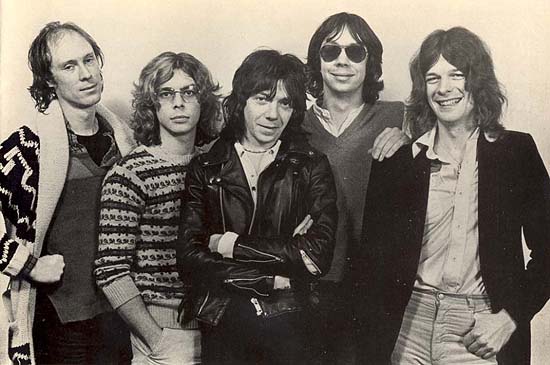 THE RAIN Dances and Live Album line-up (l to r): Richard Sinclair, Andy Ward, Peter Bardens, Andrew Latimer and Mel Collins. |
||
|
"We hadn't got the idea of doing a concept album when
we went down there," explains Latimer, "But after a week or
so, we'd decided that a concept album it would be. But Peter
wanted to do Steppen Wolf and I wanted to do The Snow
Goose. Eventually, we agreed on Snow Goose and we worked
hard at it and within two weeks had written the majority of it. "It was a strange album in as much as we wrote the whole thing and practised each piece, but we never ever played it all the way through, so we had no real idea what the overall result would be. But when we heard the finished result we were chuffed. We thought it was going to be a wondrous thing." In the production chair for Snow Goose was David Hitchcock, who had also produced Mirage. "He helped us organise things like getting together with David Bedford," explains Latimer. "He more or less took control when the studio musicians and orchestra came in to do their parts. "Snow Goose was such a successful album for both Peter and myself because it came very close to what we had in our minds about the project. "Whether it was successful as a commercial thing is irrelevant. It was successful to us - and that's what art's all about anyway. "As it happens, it did turn out to be successful for the band because it pushed us up into the public eye. It was the turning point for Camel because, up until then, we had been a band that people took little notice of. "We charted, got a Brightest Hope award from Melody Maker and played the Royal Albert Hall concert. We were working well together, Peter and I, at this stage. We still had out arguments and disagreements in the studio, but we were all pulling together. It was a very harmonious time for the band." Following Snow Goose was a problem. Latimer: "We decided to steer clear of conceptual albums and started to put more emphasis on the vocals. There was also outside pressure from the record companies, particularly in the US. I recall a meeting in New York where they were horrified to find that Snow Goose had no vocals. They freaked!" After Snow Goose performed live at the Royal Albert Hall with the London Symphony Orchestra conducted by David Bedford, plus further touring, it was time to start thinking about the next album - Moon Madness. Latimer: "That whole album was rushed. We only had about three weeks to write the material and about the same period of time to rehearse it. It was fairly successful, though it wasn't earth shattering. But what it did do was to get us back into the swing of writing songs again. Also it proved our most successful album in the US." |
The guiding lights and writing through the band's first four
albums were Latimer and Bardens, a team Latimer refers to as
Rogers and Hammersmith. "We'd always worked together
well," says Latimer. "Our situation was probably a lot like
Lennon and McCartney where one of us would write more
than the other in whatever particular number we were doing." Rain Dances saw a noticable change in Camel's musical direction. In essence, the songs had become shorter and Jazzier. "It was probably a reaction against Moon Madness, says Latimer, but we wanted to do more concise material and we also wanted to get into jazzier areas. Doug left at that stage and Richard Sinclair came in. Richard could play all the jazzy things we wanted - and some of them were quite complex. I really like Rain Dances. I still listen to it. The actual production is much better and we were able to stretch out a lot more on the complex material which we hadn't been able to do before because Doug and Andie couldn't quite cope with the more detailed time signatures." Changes in the band's direction and style have generally been well-received by their loyal fans. Latimer: "The fans like to be given something new. One of the reasons Camel has lasted so long is because we have changed and the fans have gone with us and accepted the change. But the changes have never been that drastic." Throughout Rain Dances, a rift was developing between Peter Bardens and Andrew Latimer. Both were pulling in separate musical directions. This trent continued from Rain Dances until Peter's farewell album with the band, Breathless. But before Breathless, the band released A Live Record. Latimer: "What we wanted it to be was more or less a history of the band - it was meant to be a life history rather than a great sounding live record." While working on Breathless, the rift between Bardens and Latimer became more apparent. Latimer: "Peter and I always get on well when creating, but the problems started when we came to the actual execution of the ideas. In the studio, Peter and I were just stifling each other. I wouldn't let him get any of his ideas out and he wouldn't let me get any of mine out, so it became pretty heavy going. We mutually agreed to part company on the creative level. Richard and Andy wanted to stay with me, so Peter went. I think it was a very good move for both of us." Though Bardens finished the album with the band, his departure created a problem for upcoming touring commitments. "It was a tricky situation," recalls Latimer. "But Richard suggested using Dave Sinclair and Jan Schelhaas with whom he'd worked in Caravan. I thought this would be a great idea because we'd be able to do much more adventurous things with two keyboards players. It worked. At one stage I did think of calling the band Caramel!" |
|